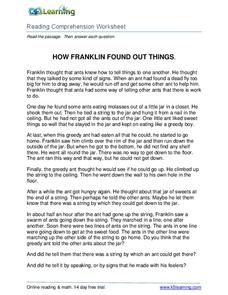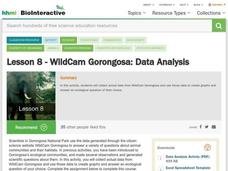Curated OER
Why did the can crush?
Students watch a demonstration to ascertain why a soda can crushed. They make observations and hypothesize about why a soda can crushed and relate the difference in pressure to its affect on objects around us (soda can). Explanation is...
Curated OER
Investigation: Evaporation
An evaporation investigation! This collection of slides walks future scientists through the process of setting up an experiment on how to speed up evaporation. The experiment is simple enough to use at the beginning of the school year to...
Curated OER
Eggs'ceptional Experiments
Young scholars see evidence of chemical reaction and follow the scientific method to hypothesize, observe, and reach conclusions. They conduct a series of egg based experiments such as forming crystals and complete journal activities as...
Curated OER
Food for Spaceflight
When astronauts get hungry in outer space, they can't just call and have a pizza delivered. In order to gain an appreciation for the challenges associated with space travel, young learners are given the task of selecting, testing, and...
Curated OER
One Sweet Experiment
This resource is designed to be used as a lab sheet when experimenting with the dissolution of sugar in water. It's very nice in that it follows the scientific method of experimentation. There are places for the definition of the...
Curated OER
"Croak" Science Mystery
Solve the mystery of a declining frog population! Lead your junior ecologists on an investigation that simulates actual events concerning pollution, predation, poaching, and more. Investigators read a story online, then analyze survey...
Curated OER
Investigating Brass Instruments and Pitch
Students observe the sounds of different brass instruments in order to understand how to create different pitches. In this musical lesson, students create a "brass" instrument from everyday household objects. The students discuss the...
Curated OER
Habitat Basics
First graders get out and explore two different habitats to examine how each one meets the needs of the plants and animals that dwell there. They discuss what they've learned about animal habitats as they explore the outdoor environment....
Baylor College
Heart Rate and Exercise
What is the relationship among the heart, circulation, and exercise? Your class members will explore first-hand how different physical exercises affect an individual's heart rate. They will begin by learning how to measure their own...
Curated OER
Where Did the Water Go? An Investigation in Scientific Methods
Students hypothesize what happened to the missing water. In this chemistry lesson, students test their hypothesis by designing an experiment. They record observations and report findings to class.
Teach Engineering
Quantum Dots and the Harkess Method
The Fantastic Voyage is becoming close to reality. The class reads an article on the use of nanotechnology in the medical field and participate in a discussion about what they read. The discussion method helps class members become more...
University of Minnesota
Dendritic Spines Lab
This is your brain on drugs ... literally! Your neuroscientists-in-training examine the evidence of drug use on the human brain and how neurons change their connectivity when altered by drugs. They then work together to create testing...
Children’s Hospital of Philadelphia
Meet the Germs
A lesson introduces scholars to the scientist, Martinus Beijerinck, the person behind virus discovery. Learners research and complete a graphic organizer that showcases the differences between a virus and bacteria. Small groups share...
National Science Teacher Association
Middle School Sampler: Science
Focus on inquiry-based learning in your science class with a series of activities designed for middle schoolers. A helpful packet samples four different texts, which include activities about predator-prey relationships, Earth's axis and...
K5 Learning
How Franklin Found Out Things
Franklin learns about the world by making observations, and so do we! A short reading assignment prompts fourth graders to answer comprehension questions about a curious boy and what he notices.
K5 Learning
Changes
You can't unring a bell, but can you unmelt an ice cube? Readers consider reversible and irreversible changes with a short informational reading passage and accompanying comprehension questions.
CK-12 Foundation
Development of Hypotheses: Pressure versus Temperature
Is it me, or is it getting hot in here? Middle school science sleuths investigate the relationship between temperature and pressure, then use their observations to form a hypothesis. Questions embedded in the interactive help guide...
CK-12 Foundation
Testing Hypotheses: Einstein
Einstein once said "A person who never made a mistake never tried anything new." Enlist his help in teaching young learners the importance of looking for mistakes in hypotheses. An interactive coaches pupils in the falsifiability of...
Towson University
Berries...With a Side of DNA?
Sometimes science lab can be ... delicious! Middle school science scholars extract DNA from strawberries and other fruits in an engaging lab activity. The teacher's guide includes pacing, materials list, and worksheets with answer keys.
IB Psychology
Key Terms Traffic Lights
How much does your class know about psychology? What about empirical evidence? If they could use some time to learn the essentials of psychology, use a quick reference sheet to note what they know before the test, after the unit, and at...
Serendip
Vitamins and Health – Why Experts Disagree
Should people take vitamins or get the needed minerals through diet? Experts disagree based on many different factors. Scholars compare study findings and discuss the differences. They learn the importance of comparing results across...
PBS
Take It in Stride
One step at a time, pupils practice their measurement techniques as they analyze their stride length. They design their own procedures for measuring and relate their stride measurements to the distance traveled by making calculations.
Howard Hughes Medical Institute
Lesson 8: WildCam Gorongosa Data Analysis
How do scientists analyze data to get a specific answer to a question? The final chapter in an eight-part series of activities centered around Gorongosa National Park encourages scholars to dig deeper into the scientific process. After...
NASA
Let's Investigate Mars
Take your science class on a hypothetical field trip to Mars with an engaging astronomy instructional activity. After first learning about NASA's Mars rover missions, young scientists plan their own scientific investigations of Earth's...

























